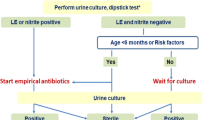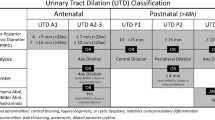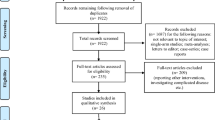Abstract
Introduction
Urinary tract infections (UTIs) are among the most frequent infections in clinical practice worldwide. Their frequency and burden must be higher than available data suggest because they are not among mandatory diseases to be notified.
Classification of urinary infections
Although there are many different proposals for classifying UTIs, classifications based on acquisition settings and complication status are more widely used. These include community- acquired UTIs (CAUTIs) or healthcare-associated UTIs (HAUTIs) and uncomplicated or complicated UTIs.
Epidemiology of urological infections and global burden
As the most frequently seen infectious disease, CAUTIs affect more than 150 million people annually. Complicated UTIs in particular constitute a huge burden on healthcare systems as a frequent reason for hospitalization. The prevalence of HAUTIs ranges between 1.4% and 5.1%, and the majority of them are catheter-related UTIs. Community-onset HAUTIs have gained importance in recent years.
Conclusion
As frequent infectious diseases, UTIs create clinical and economic burdens on healthcare systems, and they also affect quality of life determinants.
Similar content being viewed by others
References
Foxman B (2002) Epidemiology of urinary tract infections: incidence, morbidity, and economic costs. Am J Med 113(Suppl 1A):5S–13S
Cardwell SM, Crandon JL, Nicolau DP, McClure MH, Nailor MD (2016) Epidemiology and economics of adult patients hospitalized with urinary tract infections. Hosp Pract 44(1):33–40
Bonkat G, Pickard R, Bartoletti R, Cai T, Bruyère F, Geerlings SE, Köves B, Wagenlehner F (2018) Guidelines on urological infections 2018, https://uroweb.org/wp-content/uploads/EAU-Guidelines-on-Urological-Infections-2018-large-text.pdf Accessed June 2019.
Tandogdu Z, Wagenlehner FM (2016) Global epidemiology of urinary tract infections. Curr Opin Infect Dis 29(1):73–79
Saint S, Kowalski CP, Forman J, Damschroder L, Hofer TP, Kaufman SR, Creswell JW, Krein SL (2008) A multicenter qualitative study on preventing hospital-acquired urinary tract infection in US hospitals. Infect Control Hosp Epidemiol 29(4):333–341
Johansen TE, Botto H, Cek M, Grabe M, Tenke P, Wagenlehner FM, Naber KG (2011) Critical review of current definitions of urinary tract infections and proposal of an EAU/ESIU classification system. Int J Antimicrob Agents 38(Suppl):64–70
Medina M, Castillo-Pino E (2019) An introduction to the epidemiology and burden of urinary tract infections. Ther Adv Urol 11:1756287219832172
Lichtenberger P, Hooton TM (2008) Complicated urinary tract infections. Curr Infect Dis Rep 10(6):499–504
Flores-Mireles AL, Walker JN, Caparon M, Hultgren SJ (2015) Urinary tract infections: epidemiology, mechanisms of infection and treatment options. Nat Rev Microbiol 13(5):269–284
Stamm WE, Norrby SR (2001) Urinary tract infections: disease panorama and challenges. J Infect Dis 183(Suppl 1):S1–S4
Taur Y, Smith MA (2007) Adherence to the Infectious Diseases Society of America guidelines in the treatment of uncomplicated urinary tract infection. Clin Infect Dis 44(6):769–774
Schappert SM, Rechtsteiner EA (2011) Ambulatory medical care utilization estimates for 2007 National Center for Health Statistics. Vital Health Stat 13(169):1–38
Foxman B (2014) Urinary tract infection syndromes: occurrence, recurrence, bacteriology, risk factors, and disease burden. Infect Dis Clin North Am 28(1):1–13
Foxman B (2010) The epidemiology of urinary tract infection. Nature Rev Urol 7(12):653–660
Mazzulli T (2002) Resistance trends in urinary tract pathogens and impact on management. J Urol 168(4 Pt 2):1720–1722
Scottish Intercollegiate Guidelines Network (2012) Management of suspected bacterial urinary tract infection in adults. (https://www.sign.ac.uk/assets/sign88.pdf) Accessed July 2019.
Gücük A, Burgu B, Gökçe İ, Mermerkaya M, Soygür T (2013) Do antibiotic prophylaxis and/or circumcision change periurethral uropathogen colonization and urinary tract infection rates in boys with VUR ? J Pediatr Urol 9:1131–6
Griebling TL (2005) Urologic diseases in America project: trends in resource use for urinary tract infections in men. J Urol 173(4):1288–1294
Griebling TL (2005) Urologic diseases in America project: trends in resource use for urinary tract infections in women. J Urol 173(4):1281–1287
Hoberman A, Chao HP, Keller DM, Hickey R, Davis HW, Ellis D (1993) Prevalence of urinary tract infection in febrile infants. J Pediatr 123(1):17–23
Sood A, Penna FJ, Eleswarapu S, Pucheril D, Weaver J, Abd-El-Barr AE, Wagner JC, Lakshmanan Y, Menon M, Trinh QD, Sammon JD, Elder JS (2015) Incidence, admission rates, and economic burden of pediatric emergency department visits for urinary tract infection: data from the nationwide emergency department sample, 2006 to 2011. J Pediatr Urol 11(5):246.e1–8
Hooton TM, Scholes D, Stapleton AE, Roberts PL, Winter C, Gupta K, Samadpour M, Stamm WE (2000) A prospective study of asymptomatic bacteriuria in sexually active young women. N Engl J Med 343(14):992–997
Moore EE, Hawes SE, Scholes D, Boyko EJ, Hughes JP, Fihn SD (2008) Sexual intercourse and risk of symptomatic urinary tract infection in post-menopausal women. J Gen Intern Med 23(5):595–599
Vincent CR, Thomas TL, Reyes L, White CL, Canales BK, Brown MB (2013) Symptoms and risk factors associated with first urinary tract infection in college age women: a prospective cohort study. J Urol 189(3):904–910
Foxman B, Barlow R, D'Arcy H, Gillespie B, Sobel JD (2000) Urinary tract infection: self-reported incidence and associated costs. Ann Epidemiol 10(8):509–515
Frances CJ, Cullen KA, Kozak LJ, National Hospital Discharge Survey (2007) (2005) Annual summary with detailed diagnosis and procedure data. National Center for Health Statistics. Vital Health Stat 13(165):1–20
François M, Hanslik T, Dervaux B, Le Strat Y, Souty C, Vaux S, Maugat S, Rondet C, Sarazin M, Heym B, Coignard B, Rossignol L (2016) The economic burden of urinary tract infections in women visiting general practices in France:a cross-sectional survey. BMC Health Serv Res 16:365
Ciani O, Grassi D, Tarricone R (2013) An economic perspective on urinary tract infection: the “costs of resignation”. Clin Drug Investig 33(4):255–261
Brown P, Moran K, Foxman B (2005) Acute pyelonephritis among adults: cost of illness and considerations for the economic evaluation of therapy. Pharmacoeconomics 23(11):1123–1142
Vallejo-Torres L, Pujol M, Shaw E, Wiegand I, Vigo JM, Stoddart M, Grier S, Gibbs J, Vank C, Cuperus N, van den Heuvel L, Eliakim-Raz N, Carratala J, Vuong C, MacGowan A, Babich T, Leibovici L, Addy I, Morris S, RESCUING Study Group, and Study Sites (2018) Cost of hospitalised patients due to complicated urinary tract infections: a retrospective observational study in countries with high prevalence of multidrug-resistant Gram-negative bacteria: the COMBACTE-MAGNET. RESCUING study. BMJ Open 8(4):e020251**
Cek M, Tandogdu Z, Wagenlehner F, Tenke P, Naber K, Bjerklund-Johansen TE (2014) Healthcare-associated urinary tract infections in hospitalized urological patients: a global perspective results from the GPIU studies 2003–2010. World J Urol 32(6):1587–1594
Wagenlehner F, Wullt B, Ballarini S, Zingg D, Naber KG (2018) Social and economic burden of recurrent urinary tract infections and quality of life: a patient web-based study (GESPRIT). Expert Rev Pharmacoecon Outcomes Res 18(1):107–117
Renard J, Ballarini S, Mascarenhas T, Zahran M, Quimper E, Choucair J, Iselin CE (2015) recurrent lower urinary tract infections have a detrimental effect on patient quality of life: a prospective, observational study. Infect Dis Ther 4(1):125–135
Ronald A (2002) The etiology of urinary tract infection: traditional and emerging pathogens. Am J Med 113(Suppl 1A):14S–19S
Gupta K, Bhadelia N (2014) Management of urinary tract infections from multidrug-resistant organisms. Infect Dis Clin North Am 28(1):49–59
MacVane SH, Tuttle LO, Nicolau DP (2014) Impact of extended-spectrum β–lactamase-producing organisms on clinical and economic outcomes in patients with urinary tract infection. J Hosp Med 9(4):232–238
Esteve-Palau E, Solande G, Sánchez F, Sorlí L, Montero M, Güerri R, Villar J, Grau S, Horcajada JP (2015) Clinical and economic impact of urinary tract infections caused by ESBL-producing Escherichia coli requiring hospitalization: a matched cohort study. J Infect 71(6):667–674
Hanna-Wakim RH, Ghanem ST, El Helou MW, Khafaja SA, Shaker RA, Hassan SA, Saad RK, Hedari CP, Khinkarly RW, Hajar FM, Bakhash M, El Karah D, Akel IS, Rajab MA, Khoury M, Dbaibo GS (2015) Epidemiology and characteristics of urinary tract infections in children and adolescents. Front Cell Infect Microbiol 5:45
Kizilca O, Siraneci R, Yilmaz A, Hatipoglu N, Ozturk E, Kiyak A, Ozkok D (2012) Risk factors for community-acquired urinary tract infection caused by ESBL-producing bacteria in children. Pediatr Int 54(6):858–862
Shaw E, Addy I, Stoddart M, Vank C, Grier S, Wiegand I, Leibovici L, Eliakim-Raz N, Vallejo-Torres L, Morris S, MacGowan A, Carratalà J, Pujol M, COMBACTE-MAGNET Consortium (2016) Retrospective observational study to assess the clinical management and outcomes of hospitalised patients with complicated urinary tract infection in countries with high prevalence of multidrug resistant Gram-negative bacteria (RESCUING). BMJ Open 6(7):e011500
Magill SS, Edwards JR, Bamberg W, Beldavs ZG, Dumyati G, Kainer MA, Lynfield R, Maloney M, McAllister-Hollod L, Nadle J, Ray SM, Thompson DL, Wilson LE, Fridkin S, Emerging Infections Program Healthcare-Associated Infections Antimicrobial Use Prevalence Survey Team (2014) Multistate point-prevalence survey of healthcare-associated infections. N Engl J Med 370(13):1198–1208
European Centre for Disease prevention and Control (2013) Point prevalence survey of healthcare-associated infections and antimicrobial use in European acute care hospitals 2011-2012. Stockholm: European Centre for Disease prevention and Control, https://ecdc.europa.eu/sites/portal/files/media/en/publications/Publications/healthcare-associated-infections-antimicrobial-use-PPS.pdf Accessed July 2019.
Allegranzi B, Bagheri Nejad S, Combescure C, Graafmans W, Attar H, Donaldson L, Pittet D (2011) Burden of endemic health-care-associated infection in developing countries: systematic review and meta-analysis. Lancet 377(9761):228–241
Suetens C, Hopkins S, Kolman J, Diaz Högberg LD (2012) Point prevalence survey of healthcare-associated infections and antimicrobial use in European acute care hospitals 2011–2012. European Center of Disease Prevention and Control https://ecdc.europa.eu/sites/portal/files/media/en/publications/Publications/healthcare-associated-infections-antimicrobial-use-PPS.pdf Accesed July 2019.
Gardner A, Mitchell B, Beckingham W, Fasugba O (2014) A point prevalence cross sectional study of healthcare-associated urinary tract infections in six Australian hospitals. BMJ Open 4(7):e005099
Cassini A, Plachouras D, Eckmanns T, Abu Sin M, Blank HP, Ducomble T, Haller S, Harder T, Klingeberg A, Sixtensson M, Velasco E, Weiß B, Kramarz P, Monnet DL, Kretzschmar ME, Suetens C (2016) Burden of six healthcare-associated infections on european population health: estimating incidence-based disability-adjusted life years through a population prevalence-based modelling study. PLoS Med 13(10):e1002150
Tandogdu Z, Cek M, Wagenlehner F, Naber K, Tenke P, van Ostrum E, Johansen TB (2014) Resistance patterns of nosocomial urinary tract infections in urology departments: 8-year results of the global prevalence of infections in urology study. World J Urol 32(3):791–801
Wagenlehner F, Naber K, Tenke P, van Ostrum E, Johansen TB (2014) Resistance patterns of nosocomial urinary tract infections in urology departments: 8-year results of the global prevalence of infections in urology study. World J Urol 32(3):791–801
Hartstein AI, Garber SB, Ward TT, Jones SR, Morthland VH (1981) Nosocomial urinary tract infection: a prospective evaluation of 108 catheterized patients. Infect Control 2(5):380–386
Saint S (2000) Clinical and economic consequences of nosocomial catheter-related bacteriuria. Am J Infect Control 28(1):68–75
Lo E, Nicolle LE, Coffin SE, Gould C, Maragakis LL, Meddings J, Pegues DA, Pettis AM, Saint S, Yokoe DS (2014) Strategies to prevent catheter-associated urinary tract infections in acute care hospitals: 2014 update. Infect Control Hosp Epidemiol 35(5):464–479
Chenoweth CE, Gould CV, Saint S (2014) Diagnosis, management, and prevention of catheter-associated urinary tract infections. Infect Dis Clin North Am 28(1):105–119
Maki DG, Tambyah PA (2001) Engineering out the risk for infection with urinary catheters. Emerg Infect Dis 7(2):342–347
Warren JW, Damron D, Tenney JH, Hoopes JM, Deforge B, Muncie HL Jr (1987) Fever, bacteremia, and death as complications of bacteriuria in women with long-term urethral catheters. J Infect Dis 155(6):1151–1158
Rosenthal VD, Dwivedy A, Calderón ME, Esen S, Hernández HT, Abouqal R, Medeiros EA, Espinoza TA, Kanj SS, Gikas A, Barnett AG, Graves N, International Nosocomial Infection Control Consortium (INICC) Members (2011) Time-dependent analysis of length of stay and mortality due to urinary tract infections in ten developing countries: INICC findings. J Infect 62(2):136–141
Gould CV, Umscheid CA, Agarwal RK, Kuntz G, Pegues DA, Healthcare Infection Control Practices Advisory Committee (2010) Guideline for prevention of catheter-associated urinary tract infections 2009. Infect Control Hosp Epidemiol 31(4):319–26
Tambyah PA, Knasinski V, Maki DG (2002) The direct costs of nosocomial catheter-associated urinary tract infection in the era of managed care. Infect Control Hosp Epidemiol 23(1):27–31
Burton DC, Edwards JR, Srinivasan A, Fridkin SK, Gould CV (2011) Trends in catheter-associated urinary tract infections in adult intensive care units–United States, 1990–2007. Infect Control Hosp Epidemiol 32(8):748–756
World Health Organization (2011). Report on the Burden of Endemic Health Care-Associated Infection Worldwide a systematic review of the literature . https://apps.who.int/iris/bitstream/handle/10665/80135/9789241501507_eng.pdf;jsessionid=64A964F12A0FAA73F2166B89CD63F264?sequence=1 Accessed July 2019.
Weiner LM, Webb AK, Limbago B, Dudeck MA, Patel J, Kallen AJ, Edwards JR, Sievert DM (2016) Antimicrobial-resistant pathogens associated with healthcare-associated infections: summary of data reported to the National Healthcare Safety Network at the centers for disease control and prevention, 2011–2014. Infect Control Hosp Epidemiol 37(11):1288–1301
Graves N, Tong E, Morton AP, Halton K, Curtis M, Lairson D, Whitby M (2007) Factors associated with health care-acquired urinary tract infection. Am J Infect Control 35(6):387–392
Laupland KB, Zygun DA, Davies HD, Church DL, Louie TJ, Doig CJ (2002) Incidence and risk factors for acquiring nosocomial urinary tract infection in the critically ill. J Crit Care 17(1):50–57
World Health Organization (2019) Healthcare Associated Infection. Fact Sheet. https://www.who.int/gpsc/country_work/gpsc_ccisc_fact_sheet_en.pdf. Accessed July 2019.
Gordon KA, Jones RN (2003) Susceptibility patterns of orally administered antimicrobials among urinary tract infection pathogens from hospitalized patients in North America: comparison report to Europe and Latin America. Results from the SENTRY Antimicrobial Surveillance Program (2000). Diagn Microbiol Infect Dis 45(4):295–301
Medina-Polo J, Arrebola-Pajares A, Perez-Cadavid S, Benítez-Sala R, Sopeña-Sutil R, Lara-Isla A, Alsonso-Isa M, Gil-Moradillo J, Justo-Quintas J, Miranda-Utrera N, Aguilar-Gisbert L, Passas-Martínez JB, Tejido-Sánchez Á (2015) Extended-spectrum beta-lactamase-producing bacteria in a urology ward: epidemiology, risk factors and antimicrobial susceptibility patterns. Urol Int 95(3):288–292
Zilberberg MD, Nathanson BH, Sulham K, Fan W, Shorr AF (2017) Carbapenem resistance, inappropriate empiric treatment and outcomes among patients hospitalized with Enterobacteriaceae urinary tract infection, pneumonia and sepsis. BMC Infect Dis 17(1):279
Tabak YP, Sung AH, Ye G, Vankeepuram L, Gupta V, McCann E (2019) Attributable clinical and economic burden of carbapenem-non-susceptible Gram-negative infections in patients hospitalized with complicated urinary tract infections. J Hosp Infect 102(1):37–44
Aguilar-Duran S, Horcajada JP, Sorli L, Montero M, Salvadó M, Grau S, Gómez J, Knobel H (2012) Community-onset healthcare-related urinary tract infections: comparison with community and hospital acquired urinary tract infections. J Infect 64(5):478–483
Saltoglu N, Karali R, Yemisen M, Ozaras R, Balkan II, Mete B, Tabak F, Mert A, Hondur N, Ozturk R (2015) Comparison of community-onset healthcare-associated and hospital-acquired urinary infections caused by extended-spectrum beta-lactamase-producing Escherichia coli and antimicrobial activities. Int J Clin Pract 69(7):766–770
Zhanel GG, Harding GK, Nicolle LE (1991) Asymptomatic bacteriuria in patients with diabetes mellitus. Rev Infect Dis 13(1):150–154
Mody L, Juthani-Mehta M (2014) Urinary tract infections in older women: a clinical review. JAMA 311(8):844–854
Ruben FL, Dearwater SR, Norden CW, Kuller LH, Gartner K, Shalley A, Warshafsky G, Kelsey SF, O'Donnell C, Means E, Amoroso W, Bochicchio G (1995) Clinical infections in the noninstitutionalized geriatric age group: methods utilized and incidence of infections The Pittsburgh Good Health Study. Am J Epidemiol 141(2):145–157
Eriksson I, Gustafson Y, Fagerstrom L, Olofsson B (2010) Prevalence and factors associated with urinary tract infections (UTIs) in very old women. Arch Gerontol Geriatr 50(2):132–135
Nicolle LE, Bradley S, Colgan R, Rice JC, Schaeffer A, Houton TM, Infectious Diseases Society of America; American Society of Nephrology; American Geriatric Society (2005) Infectious Diseases Society of America guidelines for the diagnosis and treatment of asymptomatic bacteriuria in adults. Clinical Infectious Diseases 40(5):643–654
Mittal P, Wing DA (2005) Urinary tract infections in pregnancy. Clin Perinatol 32(3):749–764
Patterson TF, Andriole VT (1997) Detection, significance, and therapy of bacteriuria in pregnancy. Update in the managed health care era. Infect Dis Clin North Am 11(3):593–608
Smaill FM, Vazquez JC (2015) Antibiotics for asymptomatic bacteriuria in pregnancy. Cochrane Database Syst Rev. https://doi.org/10.1002/14651858.CD000490.pub3
Matuszkiewicz-Rowińska J, Małyszko J, Wieliczko M (2015) Urinary tract infections in pregnancy: old and new unresolved diagnostic and therapeutic problems. Arch Med Sci 11(1):67–77
Schnarr J, Smaill F (2008) Asymptomatic bacteriuria and symptomatic urinary tract infections in pregnancy. Eur J Clin Invest 38(Suppl 2):50–57
Wing DA, Fassett MJ, Getahun D (2014) Acute pyelonephritis in pregnancy: an 18-year retrospective analysis. Am J Obstet Gynecol 210(3):219.e1–6
Ness D, Olsburgh J (2019) UTI in kidney transplant. World J Urol. https://doi.org/10.1007/s00345-019-02742-6
Alevizakos M, Nasioudis D, Mylonakis E (2017) Urinary tract infections caused by ESBL-producing Enterobacteriaceae in renal transplant recipients: a systematic review and meta-analysis. Transpl Infect Dis 19(6):e12759
Marion TE, Rivers CS, Kuerban D, Cheng CL, Fallah N, Batke J, Dvorak MF, Fisher CG, Kwon BK, Noonan VK, Street JT (2017) Previously identified common post-injury adverse events in traumatic spinal cord injury validation of existing literature and relation to selected potentially modifiable comorbidities: a prospective Canadian cohort study. J Neurotrauma 34(20):2883–2891
Author information
Authors and Affiliations
Contributions
ÖR: Review and analysis of the literature, developing the general framework and synthesizing the available data, writing the manuscript. MA: Review of the literaute, writing the manuscript, preparing the final work for submission.
Corresponding author
Ethics declarations
Conflict of interest
The authors declare that they have no conflicts of interest.
Human and animal rights
Not applicable as this is a review article.
Informed consent
Not applicable as this is a review article.
Additional information
Publisher's Note
Springer Nature remains neutral with regard to jurisdictional claims in published maps and institutional affiliations.
Rights and permissions
About this article
Cite this article
Öztürk, R., Murt, A. Epidemiology of urological infections: a global burden. World J Urol 38, 2669–2679 (2020). https://doi.org/10.1007/s00345-019-03071-4
Received:
Accepted:
Published:
Issue Date:
DOI: https://doi.org/10.1007/s00345-019-03071-4




